- Регистрация
- 17 Февраль 2018
- Сообщения
- 38 906
- Лучшие ответы
- 0
- Реакции
- 0
- Баллы
- 2 093
Offline
Making music has never been so easy: These tools transform lyrics, ideas, and melodies into finished tracks.

Image: Ant Palmer/Shutterstock.com
Is it possible to compose your own songs without any instrument or knowledge of sheet music? The answer is now a definitive yes. Thanks to specialized AI services, this is no longer a problem. They analyze countless pieces of music, recognize patterns and use them to create new compositions including lyrics, melody, and arrangement. This is not only fun, but also opens up completely new creative possibilities.
Content creators and amateur musicians in particular can reap huge benefits. Here we’ll show you how AI song generators work and which platforms are particularly worthwhile.
How music production with AI works
AI music generators all work according to a similar principle: you enter a few key data—genre, mood, length or a short text—and the software creates a complete song from it. Behind this are machine learning models that have analyzed millions of pieces of music and derive structures for melody, rhythm, and lyrics.
Some platforms even allow users to hum a melody or upload an instrumental, which is then expanded or remixed by the AI.
On the question of costs: Many services offer a free entry-level version, which is usually limited to a few tracks per month or is only released for private use. If you want to use songs commercially or have unlimited downloads, in most cases you will need a paid subscription. Prices are usually between 10 and 40 dollars per month.
Here is a brief description of the classic song creation process using the Udio tool:
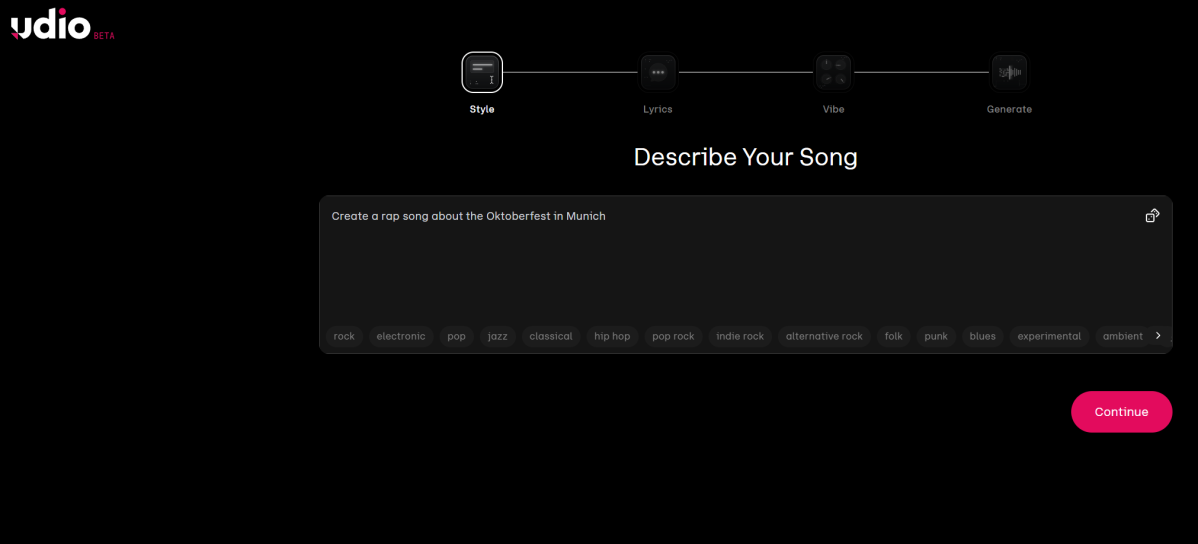
First enter a prompt, which should be generated.
Sam Singleton
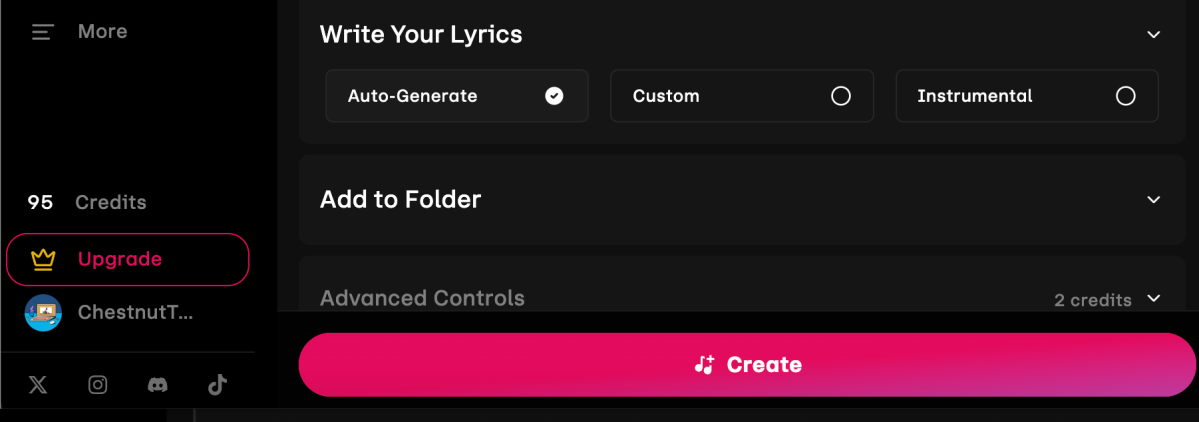
You can have song lyrics created (“Auto-Generate”), use your own (“Custom”) or omit them completely (“Instrumental”).
PC-Welt
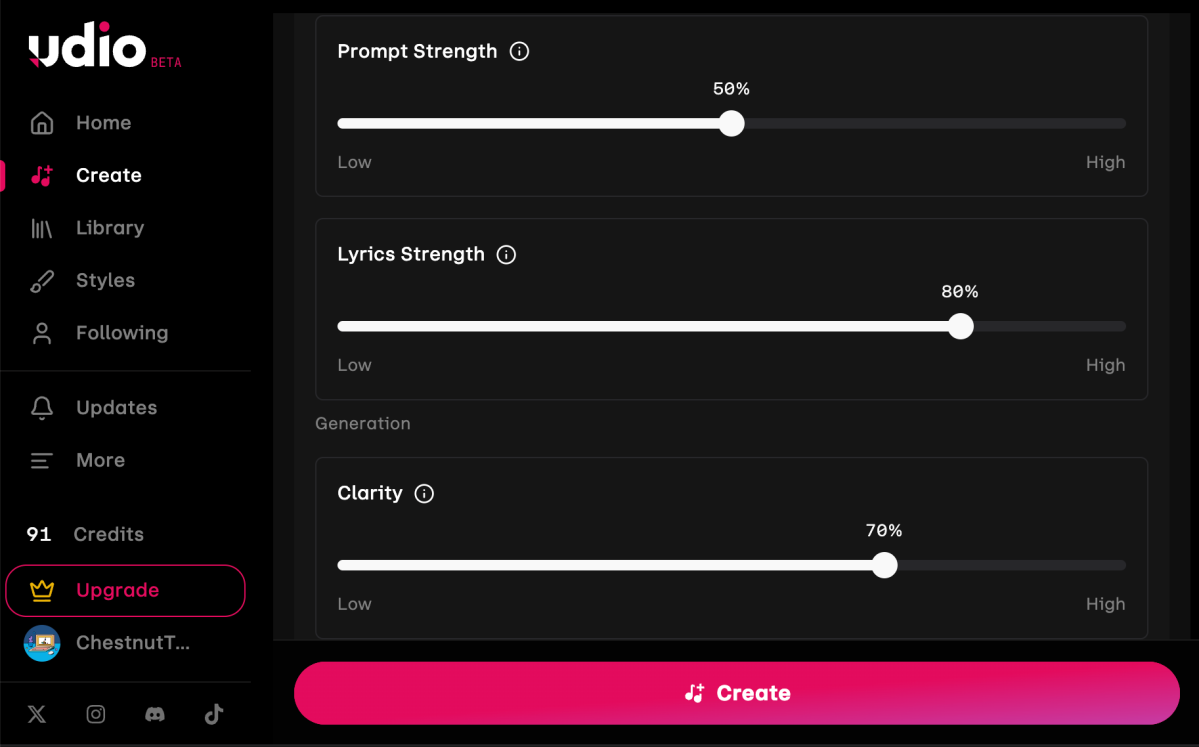
Before you create a song, you can make various settings.
PC-Welt
The result is always a finished track—often even several—which you can listen to, download or edit immediately. For example, you can add an intro or outro, add another verse or create a remix.
Popular AI music generators at a glance
Udio
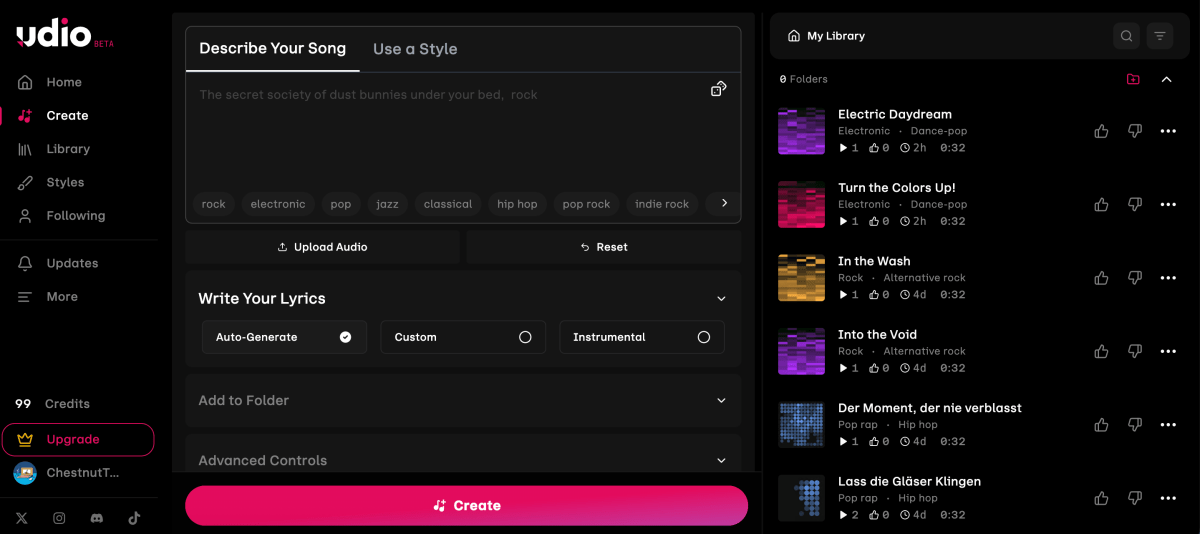
Udio AI
PC-Welt
The tool we just introduced and which you can see in the pictures is Udio, which is often referred to as a “ChatGPT for music”. Here you simply enter a prompt—such as “Love Song in Country Style”—and the AI creates up to four songs at the same time, which you can adapt or expand later. Operation is relatively intuitive, so you can quickly achieve results even without prior knowledge.
In the free version, three full-length songs (maximum 2:10 minutes) can be generated per day; all others are limited to short 32-second clips and serve more as previews.
If you want more freedom, you need a subscription starting at $10 per month (or $8 per month with an annual subscription). Only in the paid plans is it also possible to use your own audios or styles, which the AI uses as a guide. This means that the basic version is very limited, but is certainly suitable for a first impression.
AIVA
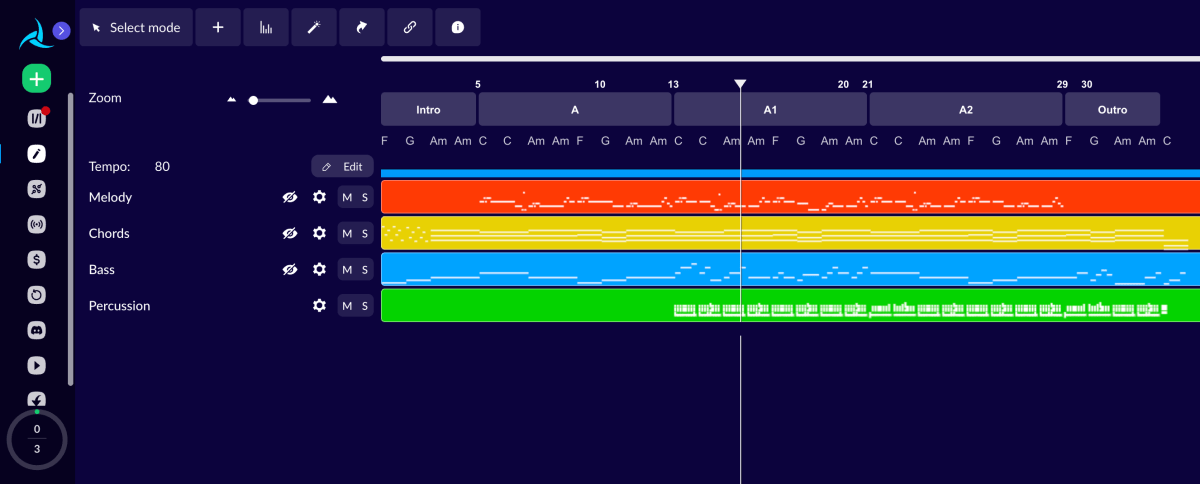
AIVA Song Editor
PC-Welt
AIVA is a classic among AI generators. The platform has been active since 2016 and specializes in orchestral music (i.e. soundtracks for games, films or advertising). The option to create your own styles and have new compositions generated based on them is particularly interesting. These pieces can then be edited in detail, which makes AIVA very flexible.
However, the tool is not entirely self-explanatory: although there are numerous tutorial videos, the many setting options require a certain level of musical knowledge. AIVA is therefore less suitable for beginners who simply want to create songs quickly. For advanced users, on the other hand, it opens up enormous creative freedom.
The free version allows you to create three tracks per month with a maximum length of three minutes (only with attribution and without a commercial license). The standard subscription starts at 11 euros per month (or around $13) and allows up to 15 downloads, while the pro version for 33 euros per month (or about $39) unlocks 300 compositions per month including your own copyright.
Suno AI

Suno AI
PC-Welt
Suno AI focuses more on fun and versatility. Songs are created here that often stand out due to their humorous lyrics—such as power ballads about coffee or rap songs about everyday objects. The free version allows you to create around ten songs per day, while a subscription is required for more serious use or commercial projects.
Prices start at $8 per month for up to 500 songs, while larger packages go up to several thousand songs. There is also a kind of style feature called “Persona”, which allows you to reuse styles or voices from songs to produce similar creations.
Soundful
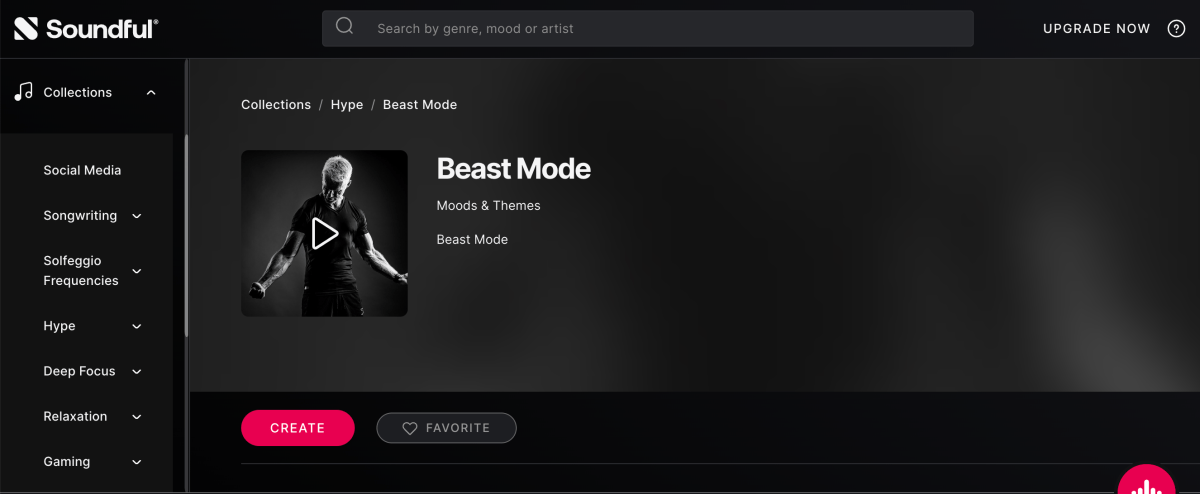
Soundful AI
PC-Welt
Anyone who primarily needs background music for content or wants to create special sounds such as solfeggio frequencies should take a look at Soundful. The tool is aimed at Youtubers, streamers, and podcasters who want to create license-free tracks at the touch of a button. There are over 50 style templates to choose from, from lo-fi to EDM, and each track is generated in such a way that it is copyright-free.
The free plan allows unlimited song creation, but only one track can be downloaded per month. With the premium annual subscription for $5 a month, you’ll gain access to 100 downloads per month, while the pro annual plan for $10 offers up to 400 downloads.
In addition to Udio, AIVA, Suno, and Soundful, there are a whole range of other platforms that could be exciting, including MusicGPT and Soundraw. Loudly is also worth mentioning: the tool comes from Germany, developed by Loudly GmbH in Berlin, and offers another intuitive AI music engine that you can try out.
This article originally appeared on our sister publication PC-WELT and was translated and localized from German.
Author: Florian Kastner, Contributor, PCWorld
Florian Kastner has been working as a freelance author in the areas of IT and marketing since 2016. He holds a computer science degree and has plenty of practical experience, specializing in the topics of AI, Android and VPN. Previously a ghostwriter, he has written for everything from computer magazines to renowned companies such as Hubspot. His passion: explaining complex issues in an understandable way, and converting them into easy-to-follow tutorials.
Recent stories by Florian Kastner:

Image: Ant Palmer/Shutterstock.com
Is it possible to compose your own songs without any instrument or knowledge of sheet music? The answer is now a definitive yes. Thanks to specialized AI services, this is no longer a problem. They analyze countless pieces of music, recognize patterns and use them to create new compositions including lyrics, melody, and arrangement. This is not only fun, but also opens up completely new creative possibilities.
Content creators and amateur musicians in particular can reap huge benefits. Here we’ll show you how AI song generators work and which platforms are particularly worthwhile.
How music production with AI works
AI music generators all work according to a similar principle: you enter a few key data—genre, mood, length or a short text—and the software creates a complete song from it. Behind this are machine learning models that have analyzed millions of pieces of music and derive structures for melody, rhythm, and lyrics.
Some platforms even allow users to hum a melody or upload an instrumental, which is then expanded or remixed by the AI.
On the question of costs: Many services offer a free entry-level version, which is usually limited to a few tracks per month or is only released for private use. If you want to use songs commercially or have unlimited downloads, in most cases you will need a paid subscription. Prices are usually between 10 and 40 dollars per month.
Here is a brief description of the classic song creation process using the Udio tool:
- Enter prompt: start with a simple text entry, for example “Love Song, Country Style, 2 minutes” or “Create a rap song about the Oktoberfest in Munich”. If you can’t think of anything, click on the small dice symbol for a random description. Important: Specify explicitly which language the song should be in. Otherwise, the AI will usually use the language in which the prompt is written.

First enter a prompt, which should be generated.
Sam Singleton
- Lyrics & Instrumental: Specify whether the song should have lyrics (autogenerated or manually inserted by you) or be instrumental.

You can have song lyrics created (“Auto-Generate”), use your own (“Custom”) or omit them completely (“Instrumental”).
PC-Welt
- Fine-tuning: Before creating, there are additional controls that are different for each tool. With Udio, for example, you can specify how strongly the prompt should characterize the content, how clear the voice should sound, or how clear the lyrics should be. When you’re finished then click on “Create”.

Before you create a song, you can make various settings.
PC-Welt
The result is always a finished track—often even several—which you can listen to, download or edit immediately. For example, you can add an intro or outro, add another verse or create a remix.
Popular AI music generators at a glance
Udio

Udio AI
PC-Welt
The tool we just introduced and which you can see in the pictures is Udio, which is often referred to as a “ChatGPT for music”. Here you simply enter a prompt—such as “Love Song in Country Style”—and the AI creates up to four songs at the same time, which you can adapt or expand later. Operation is relatively intuitive, so you can quickly achieve results even without prior knowledge.
In the free version, three full-length songs (maximum 2:10 minutes) can be generated per day; all others are limited to short 32-second clips and serve more as previews.
If you want more freedom, you need a subscription starting at $10 per month (or $8 per month with an annual subscription). Only in the paid plans is it also possible to use your own audios or styles, which the AI uses as a guide. This means that the basic version is very limited, but is certainly suitable for a first impression.
AIVA

AIVA Song Editor
PC-Welt
AIVA is a classic among AI generators. The platform has been active since 2016 and specializes in orchestral music (i.e. soundtracks for games, films or advertising). The option to create your own styles and have new compositions generated based on them is particularly interesting. These pieces can then be edited in detail, which makes AIVA very flexible.
However, the tool is not entirely self-explanatory: although there are numerous tutorial videos, the many setting options require a certain level of musical knowledge. AIVA is therefore less suitable for beginners who simply want to create songs quickly. For advanced users, on the other hand, it opens up enormous creative freedom.
The free version allows you to create three tracks per month with a maximum length of three minutes (only with attribution and without a commercial license). The standard subscription starts at 11 euros per month (or around $13) and allows up to 15 downloads, while the pro version for 33 euros per month (or about $39) unlocks 300 compositions per month including your own copyright.
Suno AI

Suno AI
PC-Welt
Suno AI focuses more on fun and versatility. Songs are created here that often stand out due to their humorous lyrics—such as power ballads about coffee or rap songs about everyday objects. The free version allows you to create around ten songs per day, while a subscription is required for more serious use or commercial projects.
Prices start at $8 per month for up to 500 songs, while larger packages go up to several thousand songs. There is also a kind of style feature called “Persona”, which allows you to reuse styles or voices from songs to produce similar creations.
Soundful

Soundful AI
PC-Welt
Anyone who primarily needs background music for content or wants to create special sounds such as solfeggio frequencies should take a look at Soundful. The tool is aimed at Youtubers, streamers, and podcasters who want to create license-free tracks at the touch of a button. There are over 50 style templates to choose from, from lo-fi to EDM, and each track is generated in such a way that it is copyright-free.
The free plan allows unlimited song creation, but only one track can be downloaded per month. With the premium annual subscription for $5 a month, you’ll gain access to 100 downloads per month, while the pro annual plan for $10 offers up to 400 downloads.
In addition to Udio, AIVA, Suno, and Soundful, there are a whole range of other platforms that could be exciting, including MusicGPT and Soundraw. Loudly is also worth mentioning: the tool comes from Germany, developed by Loudly GmbH in Berlin, and offers another intuitive AI music engine that you can try out.
This article originally appeared on our sister publication PC-WELT and was translated and localized from German.
Author: Florian Kastner, Contributor, PCWorld
Florian Kastner has been working as a freelance author in the areas of IT and marketing since 2016. He holds a computer science degree and has plenty of practical experience, specializing in the topics of AI, Android and VPN. Previously a ghostwriter, he has written for everything from computer magazines to renowned companies such as Hubspot. His passion: explaining complex issues in an understandable way, and converting them into easy-to-follow tutorials.
Recent stories by Florian Kastner:
